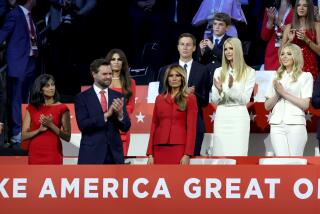AFL-CIO Leadership Is Still Divided on Abortion
- Share via
BAL HARBOUR, Fla. — Rarely has the AFL-CIO been subjected to so much pressure from outside forces on a proposed resolution as it has been in recent weeks on the old but still explosive issue of abortion.
Unfortunately, the labor federation’s executive council is dodging the question this week at its meeting here, although probably not because of outside pressures. The labor officials themselves are so sharply divided on the potential impact of the pro-choice position they seem to favor that they may not even have the courage any time in the near future to deal directly with the divisive issue.
But if pressure continues from the pro-choice forces, that will probably change, as it did last week at a meeting of the American Bar Assn. in Los Angeles. Delegates to the lawyers’ session passed a resolution favoring a woman’s right to choose an abortion.
A similar resolution from leaders of the 14-million-member AFL-CIO this week would provide a valuable assist to the abortion rights movement since the federation has substantial political muscle in Washington and state legislatures.
It is hard to understand why the union leaders are having so much trouble taking a stand.
The key obstacle to a pro-choice position is not that it is morally wrong but that it faces vociferous opposition and could split an already weakened labor movement.
Yet few issues have such widespread support. The latest Los Angeles Times poll showed that 74% of all Americans believe that women, not the government, should have the right to choose abortion.
Outsiders injecting themselves into the sometimes highly emotional debate within the labor movement are, among others, leaders of abortion rights forces and, with more public display, the Catholic Church and the National Right to Life Committee.
The committee sent out a “legislative alert” warning its members and friends that the nation’s top labor leaders are meeting this week and might approve a resolution supporting legal abortion. The committee urged its supporters to protest the proposed resolution, which they have been doing.
Cardinal John J. O’Connor of New York called on the federation not to endorse a pro-choice position but if it does, he said, union members opposing that position should be allowed to “send their (union) dues to the pro-life movement.”
Msgr. George E. Higgins, professor of theology at the Catholic University of America in Washington and an influential longtime friend of organized labor, said in a letter to council members that, until now, he has “scrupulously refrained from getting involved as an outsider in the internal affairs” of unions. But he urged them not to reverse their tradition of neutrality on the abortion question, warning that a pro-choice stand would risk alienating a large segment of union members “just when labor is very much on the defensive and desperately needs to put a high premium on unity and solidarity.”
Usually, federation leaders resolve hotly debated issues with little, if any, public attempts by outsiders to influence their decisions. And no matter how badly divided they have been, labor leaders have seldom hesitated to offer leadership on widely disparate issues, from U.S. actions in Central America to the minimum wage.
But so far they have backed away from the abortion issue even though, as AFL-CIO Vice President Joyce Miller says: “It certainly is a labor issue because it encompasses questions of economics, health, privacy, the family and other matters that are all so vital to workers and the labor movement.”
At the AFL-CIO convention last November, delegates appeared to favor a resolution supporting a woman’s constitutional right to choose abortion, but no vote was taken then. No one argued for anti-abortion laws, but those opposing the pro-choice resolution argued that the question is so controversial and divisive that the federation should ignore it.
The convention debate ended evasively. Delegates almost unanimously agreed to shift the problem to the shoulders of the federation’s 35-member executive council, which opened its session here on Monday.
AFL-CIO President Lane Kirkland on Monday named a special committee to further study the much studied issue and the committee is expected to recommend a pro-choice course of action that the executive council will follow.
The unionists argue over the moral questions involved in abortion, as everyone else does. But if that were all, the federation would almost surely have adopted a pro-choice position by now because most of the leaders, like the general public, apparently support it.
The more difficult problem for the union is the one politicians are increasingly struggling with these days: How will their constituents react?
By exerting leadership on the controversial issue and, presumably, supporting abortion rights, the federation may anger militant anti-abortionists. But those who oppose the decision could hardly argue logically against the right of the majority to make it.
Another factor: Only 13% of working women are union members, compared to 20% of all men. Yet nearly half of all workers are women. To increase its declining membership, labor must, among other things, make a strong appeal to women.
Since a large majority of women seem to want the legal right to have an abortion, union leaders should act for pragmatic reasons, as well as out of conviction, and back an abortion rights resolution soon.
More to Read
Get the L.A. Times Politics newsletter
Deeply reported insights into legislation, politics and policy from Sacramento, Washington and beyond. In your inbox twice per week.
You may occasionally receive promotional content from the Los Angeles Times.










